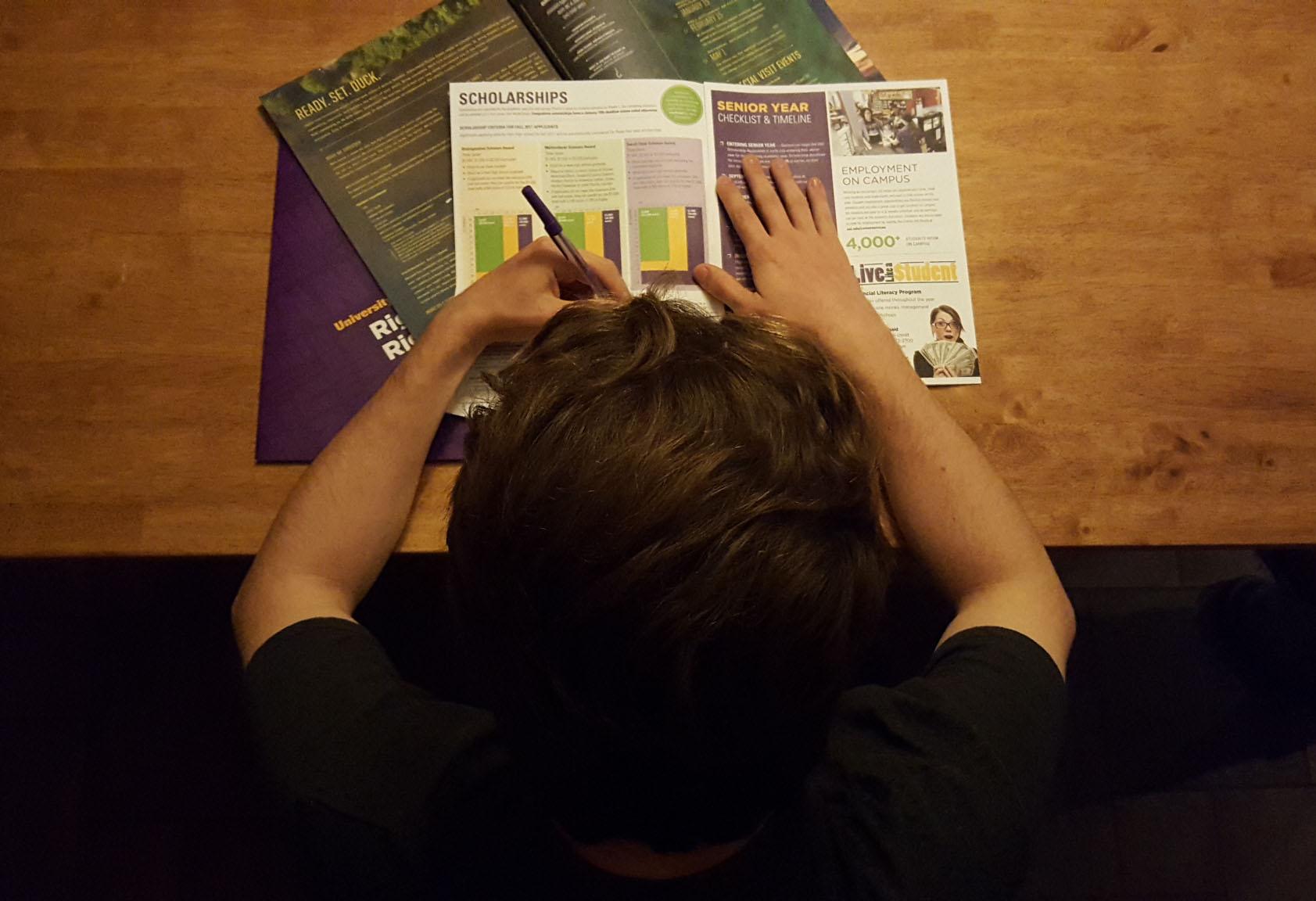Aiming for an acceptance letter
November 18, 2016
The process of searching and applying to colleges is always a stressful time for students. The most complex part is figuring out what colleges want out of incoming freshmen. Some basics that admissions officers look at are students taking classes that exceed the basic requirements for graduation, ACT/SAT scores that are consistent with high school performance and students that are geographically, economically and politically diverse that can contribute to a well-rounded student body.
Working on the homefront
The activities and positions students hold in high school can put them at a high advantage when applying to different schools. Lexi Rivett ‘17 is involved in speech and debate, mock trial, Iowa High School Speech Association (IHSSA) and she is also a student representative for the school board. “These activities specifically have helped me when applying to colleges, just because last night I was (applying for) a scholarship and they specifically asked for speech and debate,” Rivett said. “I feel like it’s just a very valued activity, because it gives you so much potential. It really teaches you skills that you are going to need for the rest of your life no matter what you do. Every skill that I’ve learned in mock trial and speech and debate, all those activities really talk about real life issues and the skills that are needed to be successful.”
High school counselors work a lot with students throughout their junior and senior years to get them prepared for the next step. “Students should be taking a variety of classes (in high school) that will spark their interests and challenge them,” counselor Sue Baker said. “That could include AP classes, or whatever they think will help them the most.”
Time management changes drastically when students go away to college. Without having a set schedule like they did in high school, students have to make their own time to study and prepare for their classes. Leadership positions also prove helpful for those applying to colleges. “Many look at leadership positions for scholarships, not necessarily for admissions.” Baker said. Baker explains that high school students who hold leadership positions shows colleges who they really are through something other than their grades and test scores.
Drake University Dean of Admissions Annie Kremer explains that all colleges are different when it comes to what they look for during the application process. “Most colleges will ask for an application and that’s just how you apply,” Kremer said. “Then as a part of the application, they will ask you to submit things like what activities you are involved in, and what things are you doing in your free time.”
Activities can range from band, to sports, to work and even caring for family members. “The most important part is the academic component,” Kremer said. “They look at the type of classes that you’re taking, courses that are college prep, or classes with an increasing level of rigor at your school.”
Engagement in an academic standpoint is an important quality in prospective college students. “At Drake, one of the first things we look at is grades. For most colleges that’s true. They really want to make sure the students they are admitting are in good shape academically for the rigor of the institution.” Kremer said.
Admissions officers want students that are willing to contribute to the student body and make it a better place. “Students get caught up in the idea that you have to check every box that you’ve done service, that you have a job, that you’re involved in music or sports.” Kremer said. “It’s great to be well-rounded and that’s a great way to go, but I would say what are you passionate about and make sure you dive into those things.”
Holding some sort of leadership position in high school is another major thing schools look at. “Leadership positions show the type of person that you are, and the type of student (colleges) will be bringing to their campuses,” Kremer said. “We want to know that we will be admitting that student that is going to be a go-getter.”
Kremer also says that they really look for students with “grit,” meaning that they have moxie and are able to persist and achieve something. “It doesn’t have to mean that you are persistent in everything you do but there is something that you’re interested in that kind of gets you fired up, that you really enjoy.” Kremer said. Leadership positions show that a student has potential to grow and contribute to the student body, even outside the classroom.
The biggest thing that students can do now to prepare for later is to do homework. Another tool to utilize when going through the college searching process in Naviance, which can help students learn more about what they might not know.
Searching for the right school
It is also important to look and apply to a variety of schools, ranging from different acceptance rates, sizes, and areas. “It’s a really fun process, let it be fun. It can be a little bit daunting and scary, navigating an ambiguous place,” Kremer said. “Know that there are a lot of people like myself and people that work in admissions offices across the country that are waiting and ready to accept any questions that you have.”
Iowa State University Director of Admissions Operations and Policy Phil Caffrey also shares some of the things a public research school looks for in high school students. “At a university like Iowa State, I think one thing that makes our university different from a lot of other schools, is that our admission requirements are extremely transparent, and they’re extremely objective,” Caffrey said. “We basically state out there to the public, ‘if you meet these requirements, you will be admitted.'” Iowa State uses the Regent Admissions Index (RAI) formula to determine what students are admitted by looking at their ACT/SAT scores, number of core courses, class rank and GPA. “There’s nothing subjective about our admissions requirements.” Caffrey said.
Caffrey explains that the RAI score of students is what Iowa State admissions officers primarily look at when admitting students. “While we would love to take in what kinds of extracurricular activities they have been involved in, what kinds of leadership roles they have held in their own school system or out in the community,” Caffrey said. “The reality is it really just boils down to the RAI score.”
Though the RAI score is the main admission form at Iowa State, students who hold leadership positions are still looked upon highly by different schools. “All colleges and universities are going to want to enroll students who are going to be very engaged and active within their campus.” Caffrey said. Caffrey tells that research has shown that high school students who hold a leadership position are more likely to be involved and engaged in college. “Students who are really engaged and connected on campus have a significantly greater chance graduating from the university than the students who don’t get involved,” Caffrey said.
Start preparing early
Caffrey’s name goes on all the deny letters to students who are not admitted to the school, and it frustrates him the amount of appeals he gets from parents and students. “Your cumulative grade point average and class rank are determined every bit as much by the grades you earn earned in ninth grade as much as the grades you earn your senior year.” Caffrey said.

Posters hang at DMACC for college transfer students. Transfer students make up about 40 percent of student populations in the three state universities.
It is important for students to be working hard all throughout their high school career, not just their junior and senior years. “In other words, a lot of students going into ninth grade don’t realize how significant those grades are. They count just as much towards your chances of being admitted to Iowa State as the grades you earn your final semester of high school.” Caffrey said.
Grades, homework and working on time management skills are the most important things high school students can be doing now to prepare for college. While the whole process can seem extremely daunting and stressful at first, using resources available to high school students now will prove helpful in the end.
